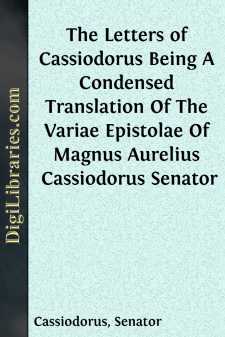Categories
- Antiques & Collectibles 13
- Architecture 36
- Art 48
- Bibles 22
- Biography & Autobiography 813
- Body, Mind & Spirit 142
- Business & Economics 28
- Children's Books 17
- Children's Fiction 14
- Computers 4
- Cooking 94
- Crafts & Hobbies 4
- Drama 346
- Education 46
- Family & Relationships 57
- Fiction 11829
- Games 19
- Gardening 17
- Health & Fitness 34
- History 1377
- House & Home 1
- Humor 147
- Juvenile Fiction 1873
- Juvenile Nonfiction 202
- Language Arts & Disciplines 88
- Law 16
- Literary Collections 686
- Literary Criticism 179
- Mathematics 13
- Medical 41
- Music 40
- Nature 179
- Non-Classifiable 1768
- Performing Arts 7
- Periodicals 1453
- Philosophy 64
- Photography 2
- Poetry 896
- Political Science 203
- Psychology 42
- Reference 154
- Religion 513
- Science 126
- Self-Help 84
- Social Science 81
- Sports & Recreation 34
- Study Aids 3
- Technology & Engineering 59
- Transportation 23
- Travel 463
- True Crime 29
The Letters of Cassiodorus Being A Condensed Translation Of The Variae Epistolae Of Magnus Aurelius Cassiodorus Senator
Description:
Excerpt
CHAPTER III.
THE GRADATIONS OF OFFICIAL RANK IN THE LATER EMPIRE.
Official Hierarchy introduced by Diocletian.It is well known that Diocletian introduced and Constantine perfected an elaborate system of administration under which the titles, functions, order of precedence, and number of attendants of the various officers of the Civil Service as well as of the Imperial army were minutely and punctiliously regulated. This system, which, as forming the pattern upon which the nobility of mediaeval Europe was to a great extent modelled, perhaps deserves even more careful study than it has yet received, is admirably illustrated by the letters of Cassiodorus. The Notitia Utriusque Imperii, our copies of which must have been compiled in the early years of the Fifth Century, furnishes us with a picture of official life which, after we have made allowance for the fact that the Empire of the West has shrunk into the Ostrogothic Kingdom of Italy (with the addition of Dalmatia and some other portions of Illyricum), is almost precisely reproduced in the pages of the 'Various Letters.' In order that the student may understand the full significance of many passages in those letters, and especially of the superscriptions by which each letter is prefaced, it will be well to give a brief outline of the system which existed alike under Theodosius and Theodoric.
Nobilissimi.In the first place, then, we come to what is rather a family than a class, the persons bearing the title Nobilissimus. These were the nearest relatives of the reigning Emperor; his brothers, sisters, sons, and daughters. The title therefore is not unlike that of Royal or Imperial Highness in modern monarchies. I am not sure whether any trace can be found of the survival of this title in the Ostrogothic Court. Theodahad, nephew of Theodoric, is addressed simply as 'Vir Senator,' and he is spoken of as 'praecelsus et amplissimus vir.' It is not so, however, in respect of the three great official classes which follow—the Illustres, Spectabiles, and Clarissimi—whose titles were rendered as punctiliously in the Italy of Theodoric as ever they were in the Italy of Diocletian and Constantine.
Illustres.I. The Illustres were a small and select circle of men, the chief depositaries of power after the Sovereign, and they may with some truth be compared to the Cabinet Ministers of our own political system. The 'Notitia' mentions thirteen of them as bearing rule in the Western Empire. They are:
1. The Praetorian Praefect of Italy.
2. The Praetorian Praefect of the Gauls.
3. The Praefect of the City of Rome.
4. The Master of the Foot Guards (Magister Peditum in Praesenti).
5. The Master of the Horse Guards (Magister Equitum in Praesenti).
6. The Master of the Horse for the Gauls (per Gallias).
7. The Grand Chamberlain (Praepositus Sacri Cubiculi).
8. The Master of the Offices.
9. The Quaestor.
10. The Count of Sacred Largesses.
11. The Count of the Private Domains (Comes Rerum Privatarum).
12. The Count of the Household Cavalry (Comes Domesticorum Equitum).
13. The Count of the Household Infantry (Comes Domesticorum Peditum).
Substantially these same titles were borne by the Illustres to whom Cassiodorus (himself one of them) addressed his 'Various Letters.' The second and the sixth (the Praetorian Praefect of the Gauls, and the Master of the Horse for the Gauls) may possibly have disappeared; and yet, in view of the fact that Theodoric was during the greater part of his reign ruler of a portion of Gaul, it is not necessary to assume even this change. Into the question of the military officers I will not enter, as I confess that I do not understand the relations (whether co-ordinate or subordinated one to another) of the two pairs of officers, Nos. 4 and 5 and Nos. 12 and 13.
The rank and duties of the Praetorian Praefect of Italy, the Master of the Offices, and the Quaestor have already been described in the . It will be well to say a few words as to the four remaining civil dignitaries, the Praefect of the City, the Grand Chamberlain, the Count of Sacred Largesses, and the Count of the Private Domains.
Praefect of the City.(a) The Praefectus Urbis Romae was by virtue of his office head of the Senate. He had the care of the Annona or corn-largesses to the people, the command of the City-watch, and the duty of keeping the aqueducts in proper repair. The shores and channel of the Tiber, the vast cloacae which carried off the refuse of the City, the quays and warehouses of Portus at the river's mouth were also under his authority....


